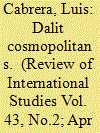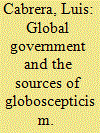|
|
|
Sort Order |
|
|
|
Items / Page
|
|
|
|
|
|
|
| Srl | Item |
| 1 |
ID:
181945


|
|
|
|
|
| Summary/Abstract |
Researchers have increasingly investigated emerging regional citizenships outside the European Union, including in Southeast Asia, South America and West Africa. Their accounts have, however, largely focused on efforts by regional organisations to promote a regional identity and enhance mobility. This article applies a broader comparative framework disaggregating regional citizenship into six constitutive elements. The approach enables a more comprehensive analysis of the nature and shape of emerging organisational citizenship regimes, the identification of potentially significant alternatives, and more systematic comparisons of both across global regions. It is applied first in identifying a duties-centric, top-down and developmental conception of citizenship implicit in recent communications to ‘ASEAN citizens’ by the Association of Southeast Asian Nations. That conception is compared to alternatives, including one implicit in Amitav Acharya’s model of participatory regionalism, and one drawn from field work among regionally networked, digitally focused social entrepreneurs within ASEAN states. The latter indicate a conception which is duties centric but also foregrounds entrepreneurs’ potential for agency and leadership in regional development. We close with a discussion of different practical challenges, related to different elements of citizenship, each conception faces, and the potential for alternatives such as entrepreneurial regional citizenship to influence emergent organisational regimes.
|
|
|
|
|
|
|
|
|
|
|
|
|
|
|
|
| 2 |
ID:
151640


|
|
|
|
|
| Summary/Abstract |
Besides stating that global or cosmopolitan citizenship is an incoherent concept in the absence of a global state, some critics assert that it represents a form of Western-centric moral neoimperialism. This article develops some responses to such objections through examining the efforts of Indian activists who have undertaken intensive international engagement in their struggles against caste discrimination. The National Campaign on Dalit Human Rights has sought to close domestic rights-implementation gaps for Dalits (formerly called untouchables) in part through vertical outreach to United Nations human rights bodies. This mode of outreach is shown to represent an important practice of global citizenship, and to challenge a view of South agent as primarily passive recipients of moral goods within a global citizenship frame. Further, the Dalit activists’ global citizenship practice is shown to be significantly ‘institutionally developmental’, in that it highlights implementation gaps in the global human rights regime and can contribute to pressures for suprastate institutional transformation and development to address them. NCDHR actions are, for example, highly salient to the recently renewed dialogue on creating a World Court of Human Rights.
|
|
|
|
|
|
|
|
|
|
|
|
|
|
|
|
| 3 |
ID:
141199


|
|
|
|
|
| Summary/Abstract |
While a number of prominent researchers have recently turned their attention to the likelihood or desirability of full world government, such an ideal has little current support in civic and popular discourse. This article seeks to identify some factors possibly reinforcing such ‘globoscepticism’. After first discussing why it should not be seen as prima facie absurd to support global political integration, and noting widespread popular support in the immediate aftermath of the Second World War, it turns to some findings on the sources of Euroscepticism. This phenomenon involves negative attitudes expressed by political elites and ordinary citizens towards European Union integration. Also considered are the determinants of attitudes towards international trade liberalisation. Insights from both areas can be applied to a preliminary exploration of globoscepticism. Specifically, they can enrich an analysis of domestic biases which naturally arise and are reinforced within a sovereign states system, and which tend to diminish support for comprehensive projects beyond the state. These pose challenges that must be addressed by academic advocates of full global integration, as well as advocates of still-ambitious but far less comprehensive projects of suprastate institution building.
|
|
|
|
|
|
|
|
|
|
|
|
|
|
|
|
|
|
|
|
|